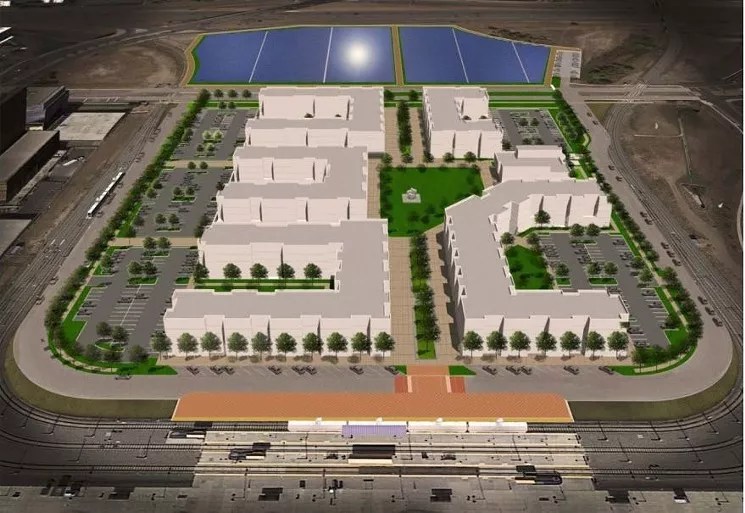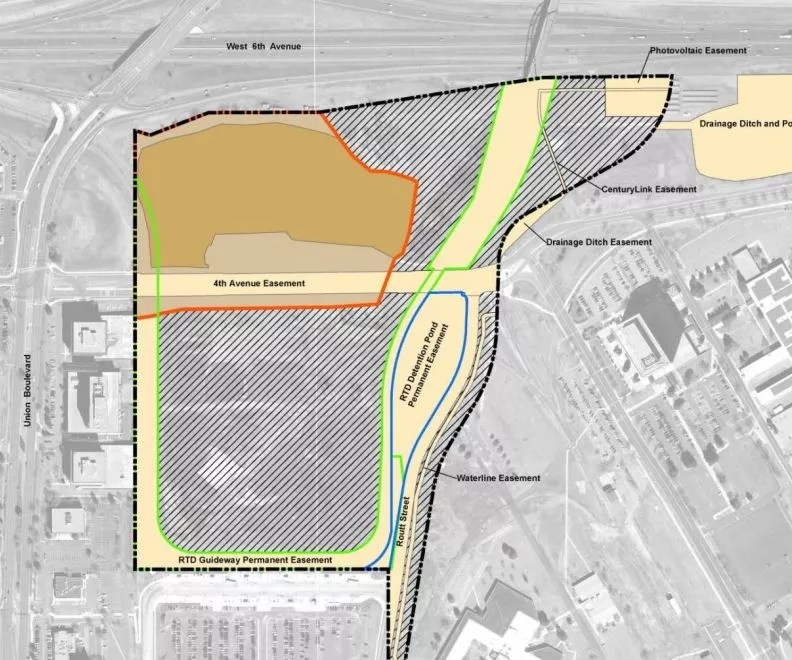
Colorado Coalition for the Homeless

Audio By Carbonatix
After a federal agency denied the financing application by the Colorado Coalition for the Homeless to build permanent supportive housing on federal land in Lakewood for as many as 1,000 people experiencing homelessness, CCH sent a letter to the feds on Wednesday, March 28, appealing the decision and asking for a review.
That despite Lakewood Mayor Adam Paul taking to Facebook this week to announce “Application DENIED,” and the federal agency that actually owns the property, the General Services Administration, gearing up to sell the land at auction.
These are just the latest twists in a complicated battle over 59 acres of land near Union Boulevard and the Denver Federal Center in Lakewood, one that’s involved three federal agencies, the Coalition, Lakewood elected officials and hundreds of fired-up residents.
We summarized some of the previous play-by-play in an article earlier this week:
[First], the Department of Housing and Urban Development determined that the site wasn’t suitable for [homeless] services because part of the property used to include a landfill. But then the federal agency that manages the property, the General Services Administration, started advertising it for mixed-use development last year.
CCH saw this as hypocritical: How could the land be safe for private development but not to serve people experiencing homelessness? In August, CCH was able to get a federal judge to stop GSA from selling the land. Then, under a federal provision known as the McKinney-Vento Homeless Assistance Act, CCH won a contract to develop the property to provide homeless services.
Now that CCH has been stymied once again by a federal agency – this time the U.S. Department of Health and Human Services, which reviewed the financial application – we caught up with Cathy Alderman, the nonprofit’s vice president of communications and public policy, to find out what happens next and to address some of the concerns by Lakewood residents who oppose the project.
Westword: Can you explain what HHS recently rejected from your organization and whether you were surprised by that decision?
Cathy Alderman: We had submitted an initial plan back in January, and HHS accepted that plan – with our details about developing the project in two phases. HHS agreed with us that that was an acceptable and good use of the property. So this second phase was our financing plan. And that was to demonstrate that we were going to be able to finance the first phase of the project, the transitional and emergency housing part. We thought we submitted a very sufficient plan, even though there are no guidelines, just that it be a reasonable financing plan. They disagreed. But they disagreed on points that could have been very easily remedied and didn’t give us the opportunity to [address them] like they’ve done for other applications in the past. So we were surprised that their letter categorically denied our plan. We anticipated hearing from them about wanting more information and getting some clarification from us. Once we had the letter, we were shocked.

A map of the site.
Colorado Coalition for the Homeless
So you’re saying it’s unusual that HHS didn’t come back to you and ask for more details about financing before making a decision?
Yes, that’s very unusual. Just recently, in 2017, San Francisco applied for a piece of federal property. And we’d been following that closely. They were able to acquire the property under the [McKinney-Vento Homeless Assistance Act]. When they submitted their financing plan, HHS came back with a number of questions and requests for additional documentation. We just assumed that that was the process that we’d be part of as well.
Apparently part of HHS’s decision was that you accidentally sent the wrong version of a PDF as part of your application.
That was absolutely our error. We had multiple files in the same folder and ended up sending an attachment that was only [signed] by one party. We had the fully executed one sitting right next to it [on the drive].
So the PDF you sent didn’t have all the signatures it needed, and that was something that HHS used as a strike against you?
Yes, they said we couldn’t use that one part of the application because it wasn’t fully executed. But it was only part of the application.
Does the Colorado Coalition for the Homeless feel confident it can fund at least the first phase of the project?
We do a lot of complicated financial plans for all of our projects – with loans, equities, tax credits, vouchers, grants – so this one was certainly bigger and more complex than most, but I don’t think it was difficult for us to put together.
Three different federal agencies – HUD, GSA and HHS – have all weighed in on this project at some point, and GSA in particular seems really eager to sell the property. Do you have any indication that these agencies are talking to each other? To what extent are they working together on this?
We do know that when HHS approved our initial plan [for phase one and phase two] in January, GSA intervened and sent them a list of questions. And that was unusual. GSA by law doesn’t have a role in evaluating the plan.
So it seems like GSA may be a little sore from the court challenge your organization presented that prevented the agency from selling the property last year.
Perhaps. And we know that when the mayor of Lakewood posted the information [on Facebook] about the financing plan being denied – in all caps, with what appeared to be some jubilation – it appeared to have been prompted from communication his office received from GSA. That’s unusual, because Lakewood was not copied on the official letter from HHS, so it appeared there was other communication going on. And we have 100-plus members of our staff working on this project, so we would have appreciated some heads-up before the information about the rejection went public.
What have you made of the reactions from Lakewood elected officials throughout this endeavor?
We’ve been as up front and transparent with them as possible about the process, our plans, the application, and we have met with them. I think we all agree that at some point we need to talk about what an ultimate plan might be. But they haven’t submitted anything to us. So at this point, it’s a little frustrating, because we’re getting some community pushback, and now it feels like we’re getting pushback from Lakewood elected officials, who are saying that the application is denied and now they want to move [past it].
The mayor said, several hours [after his Facebook post about the application being denied], that homelessness is an issue Lakewood has to address. Well, our mission is to provide housing and services and safety for people experiencing homelessness so that we can eliminate homelessness! We’d like to see some of that same drive and attention coming from the City of Lakewood.
One sticking point, if I understand this correctly, is that to satisfy the McKinney-Vento Act and receive federal property for homeless services, you have to use the entire property, not just part of it. And that makes this situation complicated, because this is a huge, 59-acre piece of land. Can you explain the technicalities of that?
Yes, I think when this act was written in the 1980s, the idea was that it would be mostly buildings transferred to shelter services. And it was deemed easier if, say, all five stories of a five-story building were dedicated to homeless services. So now the standard is that a whole property – even one like the property at the Denver Federal Center – has to be used. That’s why we suggested a phase one and phase two of our project, so we could use all the land for temporary housing while building the permanent structures.
Is there any wiggle room on that? Because I know your CEO, John Parvensky, mentioned that he was open to only using part of the property and having the rest be sold as market-rate, private development.
Yes, we originally asked if the property could be subdivided and we could use a portion. They wouldn’t allow us to do that.
It seems like there is a very dedicated group of Lakewood residents who oppose this project. There are concerns that the project is going to create unsafe conditions, bring vagrants to Lakewood, cause a spike in drug use and alcohol use in a suburban area, depreciate property values. What is your response to those concerns, and why is this project so important?
I think there’s always a lot of fear whenever we build something. But once you provide housing for people who are homeless, then they are no longer sleeping in the alleys or behind a dumpster. They are in a home. And yes, there is a large percentage of people experiencing homelessness that do often have substance abuse disorders or suffer from mental illness and have physical health issues that have gone unaddressed, but once they’re housed, they’re often able to address them and get on a path to recovery. And that’s our mission and our job: to help house and stabilize people. So we’re not just going to bring people to an area and leave them there to suffer. We’re going to be working with them and providing case-management services and all the other services that they need to become successful. And I think the fear about all these people coming from Denver to Lakewood – that’s just not true. There are so many people living in the streets and parks and down by the river in Jefferson County and the Lakewood area, and so even with this development, we probably won’t be able to serve everyone who’s in need in that community.
So what happens next? You submitted a letter on March 28 asking for another review of the finance application. Have you heard any response yet?
We haven’t heard anything official. The McKinney-Vento process does not have an appeal process in place. But we have to exhaust all administrative remedies before we can go to court, which we would do. So we felt like we’d make the request for re-consideration, make the appeal, provide all the corrective information and additional information we’d anticipated being asked for, and maybe that would make HHS realize that their decision has been wrongfully made and is misinformed.
For your organization, how rare is an opportunity like acquiring the federal property in Lakewood?
Public land, especially this size, is really uncommon. It really is a once-in-a-lifetime opportunity for us to accommodate a development of long-term housing. We hear people who say, “Why can’t they do it somewhere else?” Well, because there’s no land anywhere else like this that could transfer to us without cost, so this is really unique and makes the development part achievable to us.